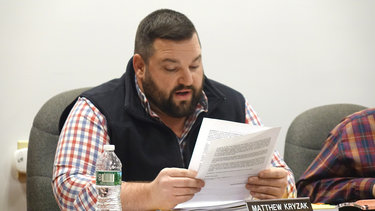Westerlo extends commercial solar and wind moratorium for 90 days
WESTERLO — The Westerlo Town Board has unanimously approved a 90-day extension to the town’s solar and wind energy moratorium, which was first instituted in 2019 to allow the town to develop a new comprehensive plan.
The extension is necessary to allow the town additional time to continue reviewing the comprehensive plan draft and three laws relating to renewable energy that are consistent findings of that draft, Deputy Supervisor Matt Kryzak said at the town board’s special meeting and public hearing on Aug. 11.
Kryzak is performing the duties of supervisor following former supervisor Bill Bichteman’s resignation earlier this year. The town board currently has four members instead of five.
The moratorium, which was initially meant to be in place for one year and was extended for another year in 2020, was scheduled to expire on Aug. 28. The new law will take place immediately upon its filing with the New York State Department of State.
“All we’re looking to do with this law is push that date back 90 days, so three months,” Kryzak said. “We’re in a spot right now where we’re on the second revision of the comprehensive plan, [and] probably the third or fourth revision of the zoning laws dealing with solar energy, battery systems, and wind energy.
“So the plan would be that, if we can get all those revisions completed and pass those items in September, we would have basically a 60-day review period for the [Albany County Planning Board] to take a look at that, and that, supposedly — I’ll say allegedly — is enough for those folks to be able to do their job, send it back to us, and for us to pass it through.
“Barring anything crazy happening, 90 days should be sufficient,” Kryzak said.
He added that the town already submitted its State Environmental Quality Review and that the county has seen the “first run” of the documents he listed. “However, we have not sent out the final [versions] and asked them for approval,” Kryzak said.
Kryzak stressed that the moratorium is not meant to “slam the door” on companies that may want to install large-scale renewable energy systems in the town, and that companies can still make a case for “unreasonable hardship,” though the town “doesn’t have to entertain it.”
When Westerlo first established the moratorium, the town was coming off a renewable energy hot-streak where it had allowed the development of five solar-energy projects, including the controversial Shepard Farm solar fields.
The town decided that a comprehensive plan would be imperative, since those plans take into account community surveys on various issues. Without a comprehensive plan, municipalities are less able to understand the desires of a community.
The Westerlo comprehensive plan draft shows that 40 percent of residents are in favor of the town promoting sensible solar-energy development, 17 percent are in favor of unregulated development, and 28 percent are entirely opposed to its promotion.
The figures for renewable wind energy are similar.
No significant concerns were raised at the public hearing about the 90-day extension, and it was passed, 4 to 0.


